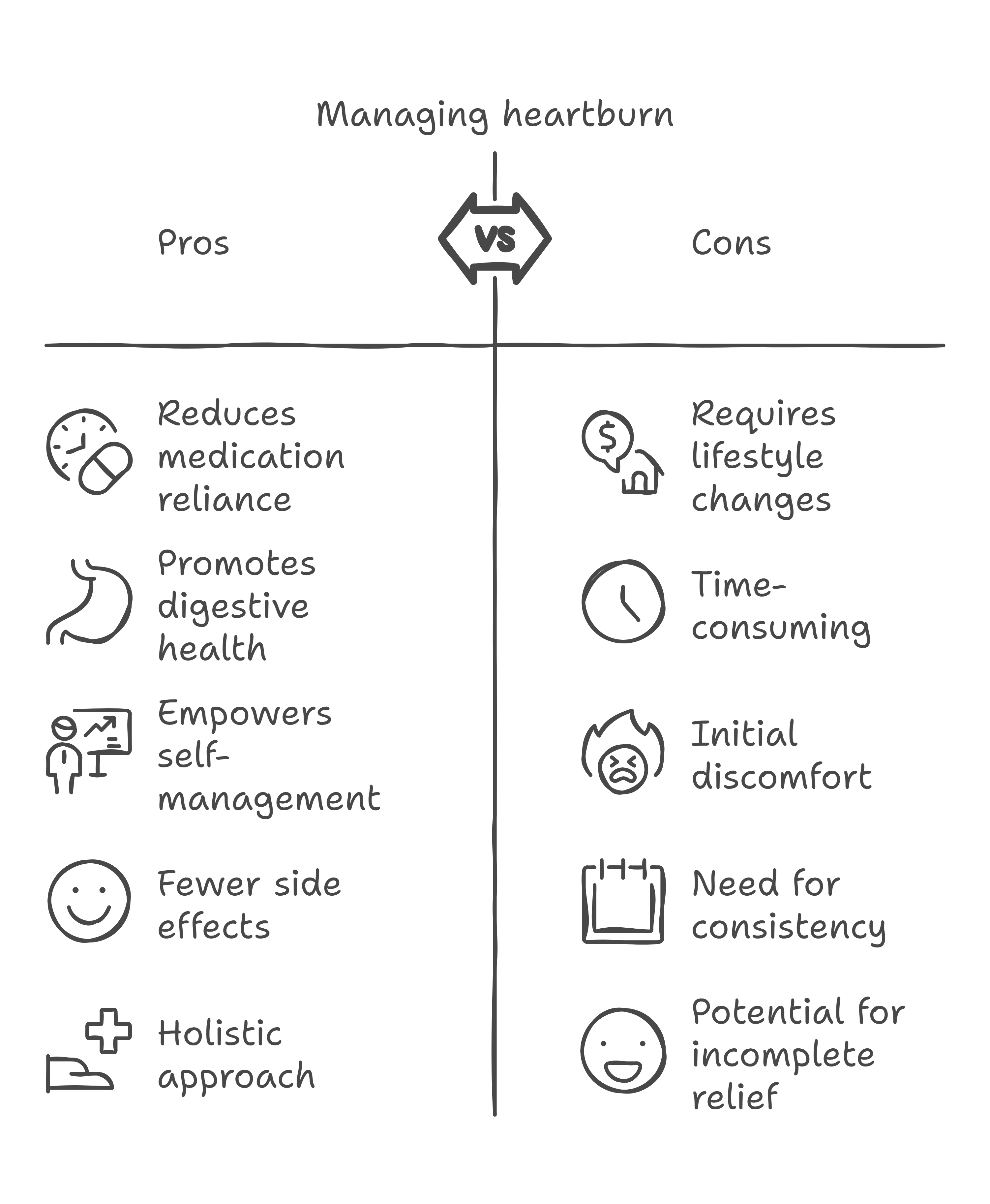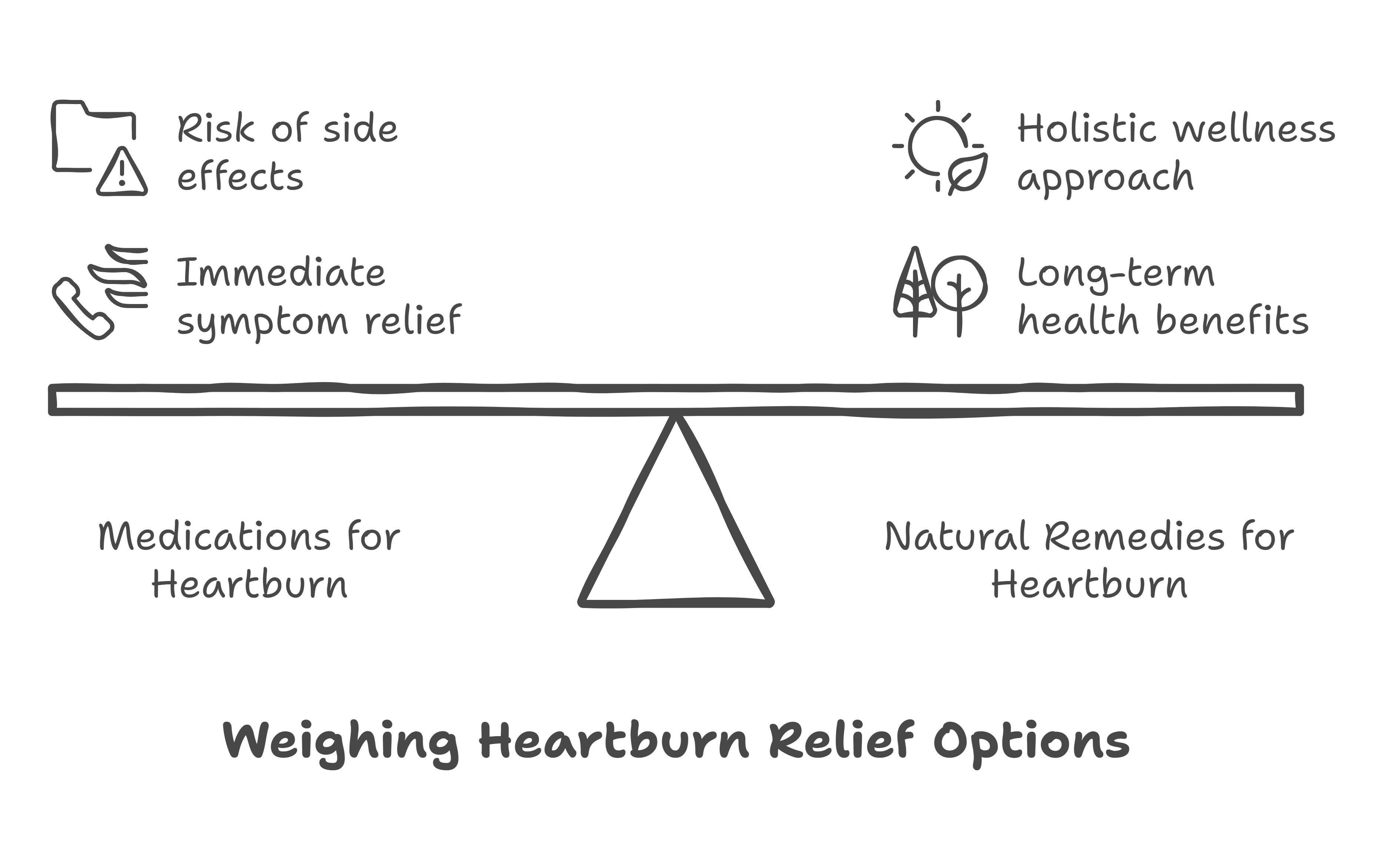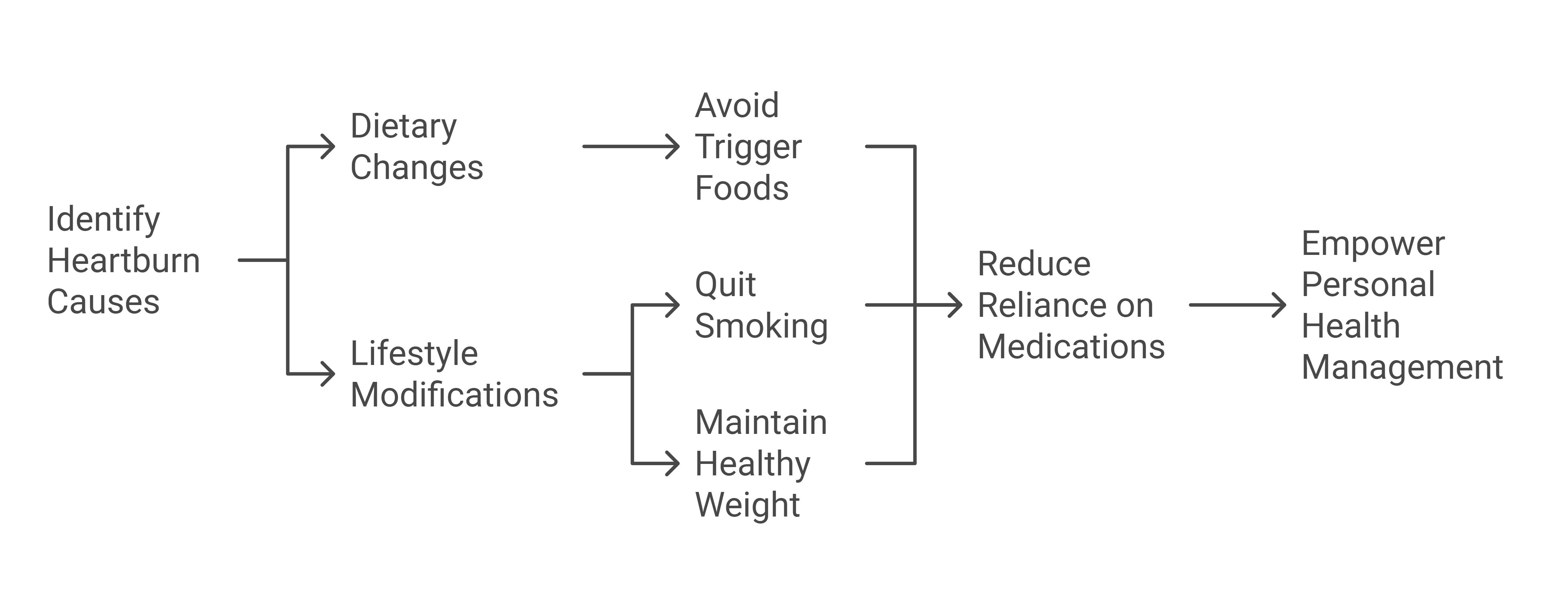The Ultimate Guide to Beating Heartburn Naturally in 2025
Heartburn affects millions of people worldwide. This common condition occurs when stomach acid flows back into the esophagus, causing discomfort and pain. The prevalence of heartburn has increased significantly, leading many to seek solutions for relief.
Addressing heartburn naturally is important for several reasons:
- Reducing reliance on medications: Many people use stomach acid pills, which can lead to side effects and dependency.
- Promoting overall digestive health: Natural remedies often support healthier lifestyle choices that benefit your entire body.
- Empowering personal health management: Knowledge of natural approaches allows you to take charge of your digestive wellness.
In this ultimate guide, you will discover:
- Effective strategies on how to stop taking your stomach acid pills.
- Practical natural heartburn remedies that can be easily incorporated into your daily routine.
- Insights on managing heartburn in 2025 by adopting a holistic approach.
By understanding these elements, you can pave the way towards a more comfortable and healthier lifestyle, free from the burdens of frequent heartburn.
Understanding Heartburn and Its Causes
Heartburn, often referred to as acid reflux, occurs when stomach acid flows back into the esophagus. This backward flow leads to discomfort and a burning sensation in the chest. Key factors contributing to heartburn include:
1. Diet
Certain foods can worsen symptoms. Common offenders include:
- Spicy dishes
- Fatty foods
- Chocolate
- Caffeine and alcohol
2. Lifestyle Choices
Habits such as smoking or overeating can increase the risk of heartburn. Stress also plays a role by affecting digestion.
3. Body Weight
Excess weight adds pressure on the stomach, which can push acid into the esophagus.
Symptoms associated with acid reflux extend beyond just a burning sensation. They may include:
- Regurgitation of food or sour liquid
- Difficulty swallowing
- Persistent cough
- Sore throat or hoarseness
For those seeking relief, various options exist, including over-the-counter (OTC) medications. Popular types of heartburn medicine include proton pump inhibitors (PPIs) and H2 blockers. Always consult with a healthcare professional to determine the best approach for managing your symptoms effectively.
The Risks of Long-Term Medication Use for Heartburn Relief
Heartburn relief often comes in the form of medications, notably:
- Proton Pump Inhibitors (PPIs): These drugs reduce stomach acid production and are commonly prescribed for chronic heartburn.
- H2 Blockers: This category also decreases acid production but works differently than PPIs.
While these medications can provide immediate relief, potential risks associated with long-term use are concerning.
Potential Side Effects of Heartburn Medications
- Nutrient Deficiencies: Long-term use may lead to deficiencies in essential nutrients like magnesium, calcium, and vitamin B12.
- Increased Risk of Infections: Lowering stomach acid can impair the body’s ability to fight off harmful bacteria, increasing susceptibility to infections such as Clostridium difficile.
- Kidney Issues: Studies have linked prolonged PPI use to kidney damage and chronic kidney disease.
Considering these risks, many individuals seek natural alternatives for managing heartburn. Emphasizing lifestyle changes and dietary adjustments can help alleviate symptoms without the potential side effects associated with heartburn medications.
Lifestyle Changes to Combat Heartburn Naturally
1. Quit Smoking
Smoking has a significant impact on heartburn due to its adverse effects on the lower esophageal sphincter (LES). The LES is a muscle that acts as a barrier between the stomach and the esophagus, preventing stomach acid from flowing upward. Nicotine, found in cigarettes, relaxes this crucial muscle, which can lead to increased acid reflux. By quitting smoking, you allow the LES to regain its strength, reducing the frequency and severity of heartburn episodes.
The benefits of quitting smoking extend beyond just alleviating heartburn symptoms. Here are some positive changes you can expect in your digestive health:
- Improved Digestion: Quitting smoking enhances overall digestive function. With a stronger LES, food moves more efficiently through the digestive tract.
- Reduced Inflammation: Smoking contributes to inflammation in the gastrointestinal tract. By eliminating tobacco use, you may experience decreased inflammation and improved healing.
- Better Nutrient Absorption: Smoking can interfere with nutrient absorption due to its detrimental effects on gut health. Without these barriers, your body can better absorb essential nutrients.
- Enhanced Taste and Smell: After quitting smoking, many individuals notice an improvement in their sense of taste and smell. This can lead to a greater enjoyment of healthy foods that support digestive health.
Taking steps toward quitting smoking can significantly reduce your reliance on medications for heartburn relief. While it may require effort and determination, numerous resources are available to assist you in this journey.
Consider these tips for successfully quitting smoking:
- Seek Support: Join a support group or enlist help from friends and family.
- Explore Alternatives: Use nicotine replacement therapies or consult with healthcare providers about medication options.
- Adopt Healthier Habits: Engage in physical activities or hobbies that distract from cravings.
Making lifestyle changes like quitting smoking not only helps combat heartburn but also promotes general well-being. Taking control of your habits will set you on the path towards long-lasting relief from acid reflux symptoms without resorting to medications.
2. Avoid Trigger Foods for Acid Reflux Relief
Implementing lifestyle changes for heartburn relief significantly involves identifying and avoiding trigger foods that worsen symptoms. Certain foods can relax the lower esophageal sphincter, leading to increased acid reflux. Recognizing these triggers is essential for managing your condition effectively.
Common Trigger Foods Include:
- Coffee: Caffeine can stimulate acid production.
- Alcohol: It relaxes the esophageal sphincter, allowing acid to escape.
- Fatty Foods: High-fat meals can slow down digestion, increasing pressure on the stomach.
- Spicy Dishes: Spices may irritate the esophagus and promote discomfort.
To eliminate these triggers from your diet, consider these strategies:
- Keep a Food Diary: Track what you eat and note any associated heartburn symptoms. This helps pinpoint specific triggers.
- Gradual Elimination: Remove one potential trigger at a time from your diet for a few weeks, then reintroduce it to see if symptoms recur.
- Substitute Wisely: Swap out trigger foods with alternatives. For example, choose herbal teas instead of coffee or opt for lean proteins rather than fatty options.
Making these dietary adjustments plays a vital role in your journey to stop taking your stomach acid pills and regain control over heartburn symptoms.
3. Maintain a Healthy Weight to Reduce Heartburn Symptoms
Addressing lifestyle changes for heartburn relief is crucial, especially when it comes to weight management. Excess weight can significantly increase pressure on the stomach, leading to a higher likelihood of acid reflux. This added pressure can weaken the lower esophageal sphincter (LES), making it easier for stomach acids to flow back into the esophagus.
To achieve and maintain a healthy weight, consider these tips:
- Balanced Diet: Focus on whole foods such as fruits, vegetables, lean proteins, and whole grains. These foods support digestion and help regulate weight.
- Regular Exercise: Aim for at least 150 minutes of moderate aerobic activity each week. Activities such as walking, biking, or swimming can enhance overall health and aid in weight management.
- Portion Control: Be mindful of serving sizes. Eating smaller, more frequent meals rather than large portions can help reduce pressure on the stomach.
- Hydration: Drink plenty of water throughout the day. Staying hydrated supports digestion and may prevent overeating.
Implementing these strategies not only aids in weight loss but also contributes to a significant reduction in heartburn symptoms. Understanding the connection between weight management and heartburn can empower you on your journey towards better digestive health and assist in your goal to stop taking stomach acid pills.
Natural Remedies for Immediate Heartburn Relief
1. Ginger: A Powerful Ally Against Acid Reflux
Ginger has long been celebrated for its medicinal properties, particularly in providing natural remedies for heartburn relief. It works effectively to alleviate nausea and symptoms associated with acid reflux due to its unique chemical compounds. Key benefits include:
- Anti-inflammatory Properties: Ginger contains gingerol, which can reduce inflammation and may help soothe the stomach lining.
- Digestive Aid: It promotes gastric motility, helping food move through the digestive tract more efficiently, which can prevent acid buildup.
Incorporating ginger into your daily routine is simple and versatile. Here are various ways to consume ginger:
- Ginger Tea: Brew fresh ginger slices in hot water for 10-15 minutes. This soothing drink can be enjoyed multiple times a day.
- Ginger in Meals: Add grated or minced ginger to stir-fries, soups, or marinades. It enhances flavor while also acting as a natural heartburn medicine.
- Candied Ginger: Chew on small pieces of candied ginger as a snack. This can be a tasty way to reap its digestive benefits.
In addition to ginger, several other natural remedies are effective for immediate heartburn relief. Consider these options:
2. Herbal Teas: Soothing Your Stomach Naturally
Herbal teas like chamomile, fennel, and peppermint can also provide relief. These teas help relax the digestive system and can replace caffeinated beverages.
3. Chewing Sugar-Free Gum: A Simple Trick for Heartburn Relief
Chewing gum stimulates saliva production, which aids in neutralizing stomach acid and provides immediate comfort.
Utilizing these natural approaches not only addresses discomfort but also supports your overall digestive health. Embracing these strategies can empower you to manage heartburn effectively without relying solely on over-the-counter medications for immediate relief.
2. Herbal Teas: Soothing Your Stomach Naturally
Natural remedies for heartburn relief have gained popularity for their effectiveness in providing quick relief from uncomfortable symptoms. One of the most soothing options is herbal tea, which can be a gentle alternative to traditional caffeinated beverages. Consider replacing drinks like coffee and black tea with calming herbal varieties.
Benefits of Herbal Teas:
- Chamomile Tea: Known for its anti-inflammatory properties, chamomile helps soothe the stomach lining and may ease digestive upset.
- Fennel Tea: Fennel has carminative properties that can reduce bloating and gas, promoting overall digestive health.
- Ginger Tea: While previously discussed, ginger tea deserves mention here for its ability to alleviate nausea and improve digestion.
These herbal teas not only provide immediate heartburn relief OTC but also contribute to a long-term strategy for managing acid reflux. Incorporating these soothing options into your daily routine may help you stop taking your stomach acid pills effectively. With various flavors available, finding the right herbal infusion to meet your taste preferences becomes an enjoyable part of your journey towards natural heartburn medicine.
3. Chewing Sugar-Free Gum: A Simple Trick for Heartburn Relief
Natural remedies for heartburn relief often focus on simple lifestyle changes that can provide immediate comfort. One such remedy is chewing sugar-free gum. This method offers several benefits:
- Increased Saliva Production: Chewing gum stimulates saliva production, which is crucial for neutralizing stomach acid. The more saliva you produce, the better equipped your body is to combat acid reflux.
- Acid Clearance: Increased saliva helps wash away acid from the esophagus, reducing irritation and discomfort associated with heartburn. This process aids in clearing any residual acid that may have escaped into the esophagus after eating.
- Convenience: Chewing gum is a portable solution that can be easily incorporated into your daily routine. Whether at work or home, it provides a discreet way to manage heartburn symptoms.
Many people have reported positive results when incorporating this simple trick into their routine. While it’s not a substitute for proper medical treatment or dietary changes, sugar-free gum stands out as one of the best OTC heartburn medicines for immediate relief.
Consider adding this natural heartburn medicine to your toolkit alongside other strategies like ginger benefits for digestion and herbal teas for a comprehensive approach to managing heartburn effectively.
Dietary Adjustments to Support Digestive Health and Prevent Heartburn Episodes
1. Increasing Fiber Intake: A Key Component of a Stomach-Friendly Diet
Dietary adjustments play a crucial role in preventing heartburn episodes. One of the most effective changes you can make is increasing your fiber intake. Fiber aids digestion and helps maintain a healthy weight, both essential factors in managing heartburn.
Benefits of Fiber:
- Promotes Healthy Digestion: Fiber helps regulate bowel movements and prevents constipation. This regulation minimizes pressure on the stomach, reducing the likelihood of acid reflux.
- Weight Management: High-fiber foods tend to be more filling, which can help control appetite and reduce calorie intake. Maintaining a healthy weight alleviates pressure on the lower esophageal sphincter (LES), potentially decreasing heartburn occurrences.
High-Fiber Foods to Incorporate:
- Fruits: Apples, pears, and berries are excellent sources of fiber. They can be consumed as snacks or added to meals for added nutrition.
- Vegetables: Leafy greens such as spinach, kale, and broccoli provide substantial amounts of fiber while offering vitamins and minerals beneficial for overall health.
- Whole Grains: Opt for whole grain bread, brown rice, quinoa, and oats instead of refined grains. These options not only enhance fiber intake but also support sustained energy levels.
- Legumes: Beans, lentils, and chickpeas are packed with fiber and protein. They can be included in salads, soups, or as side dishes.
Incorporating these high-fiber foods into your meals can significantly contribute to digestive health. Aim for a balanced diet that prioritizes whole foods while minimizing processed options.
As you explore dietary adjustments for preventing heartburn episodes, consider how fiber-rich foods can transform your eating habits. Making these changes will not only aid in digestion but may also help you on your journey to stop taking your stomach acid pills effectively. Keeping track of how these dietary alterations impact your symptoms will guide you toward optimal choices tailored to your needs.
2. Managing Meal Timing: Timing Matters When It Comes to Acid Reflux Prevention
Dietary adjustments play a crucial role in managing heartburn. One important factor is meal timing. Eating meals at least three hours before lying down significantly reduces the risk of nighttime reflux. This practice minimizes the chance of stomach contents flowing back into the esophagus while you sleep.
Consider these key points:
- Gravity’s Role: Staying upright after eating allows gravity to help keep food in your stomach, reducing pressure on the lower esophageal sphincter (LES).
- Digestion Process: The body requires time to digest food properly. Lying down too soon can interfere with this process, leading to discomfort.
- Avoid Late-Night Snacks: Late-night eating can exacerbate symptoms. Opt for lighter meals earlier in the evening.
Incorporating meal timing strategies is essential for preventing heartburn episodes. Pairing these strategies with high-fiber foods aids digestion while maintaining a healthy weight. As you explore ways on how to stop taking your stomach acid pills, remember that adopting a mindful approach to meal timing can enhance your overall digestive health and well-being.
Monitoring Symptoms and Triggers: Keeping Track of Your Heartburn Journey Towards Natural Relief
Monitoring symptoms and triggers is essential for effective heartburn management. Understanding your body’s responses can lead to better choices and strategies that minimize discomfort. Tracking your experiences allows you to identify patterns, enabling you to take proactive measures against heartburn.
1. Keeping a Food Diary: Uncovering Your Unique Triggers Through Tracking What You Eat
A food diary serves as a powerful tool in your journey towards natural relief from heartburn. By recording what you eat and noting any symptoms, you can gain valuable insights into your personal triggers. Here’s how to effectively maintain a food diary:
- Daily Entries: Write down everything you consume throughout the day, including meals, snacks, and beverages.
- Symptom Logging: Note the time symptoms occur following meals or specific foods. Include details such as severity and duration.
- Identify Patterns: After several weeks of tracking, review your entries to see if certain foods consistently correlate with heartburn episodes.
Common triggers you might discover include:
- Caffeinated drinks
- Spicy foods
- Fatty dishes
- Alcohol
Recognizing these patterns helps you eliminate or reduce trigger foods from your diet. This proactive approach can lead to substantial improvements in your overall digestive health.
In addition to food tracking, consider documenting other lifestyle factors:
- Stress levels
- Physical activity
- Sleep patterns
Understanding how these variables interact with your diet can provide a comprehensive view of what exacerbates or alleviates heartburn symptoms.
For those seeking to stop taking stomach acid pills, monitoring symptoms alongside dietary adjustments is crucial. It empowers you to make informed decisions about what works best for your body and encourages natural remedies that align with your health goals.
Utilizing a food diary not only aids in identifying triggers but also reinforces accountability in managing heartburn naturally. Embrace this strategy as part of your holistic approach to achieving lasting relief from acid reflux symptoms.
FAQs (Frequently Asked Questions)
What is heartburn and what causes it?
Heartburn is a burning sensation in the chest caused by acid reflux, where stomach acid flows back into the esophagus. Common causes include dietary choices, lifestyle factors, and certain medical conditions.
What are the risks associated with long-term use of heartburn medications?
Long-term use of heartburn medications, such as proton pump inhibitors (PPIs) and H2 blockers, can lead to potential side effects including nutrient deficiencies, increased risk of kidney disease, and gut infections. It’s important to explore natural alternatives.
How can lifestyle changes help manage heartburn?
Lifestyle changes such as quitting smoking, avoiding trigger foods, maintaining a healthy weight, and managing meal timing can significantly reduce heartburn symptoms. These modifications support digestive health and alleviate pressure on the lower esophageal sphincter.
What natural remedies can provide immediate relief from heartburn?
Natural remedies for immediate relief include ginger, which can be consumed in tea or meals; herbal teas like chamomile or fennel; and chewing sugar-free gum to increase saliva production and help clear acid from the esophagus.
How important is monitoring symptoms and triggers for managing heartburn?
Monitoring symptoms and triggers is crucial for effective heartburn management. Keeping a food diary helps identify specific foods or habits that exacerbate symptoms, allowing for targeted adjustments in diet and lifestyle.
What dietary adjustments can support digestive health to prevent heartburn episodes?
Dietary adjustments include increasing fiber intake through high-fiber foods to aid digestion and weight management. Additionally, managing meal timing by eating at least three hours before lying down can help prevent nighttime reflux.




